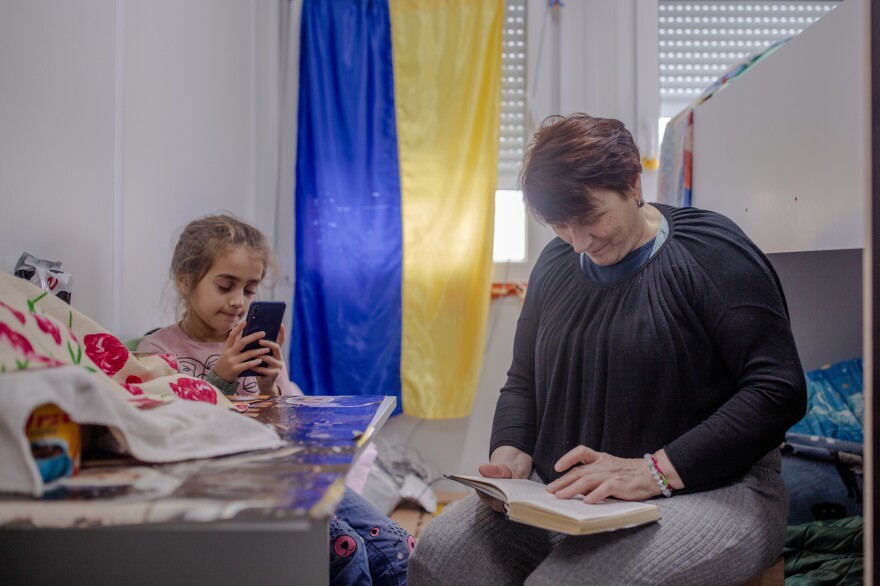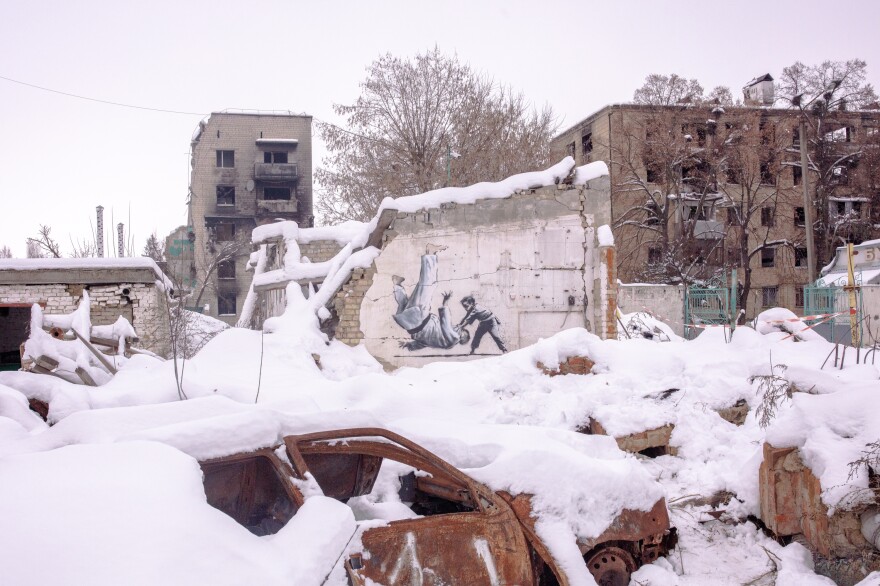BORODIANKA, Ukraine — The Russian troops who pulverized this small town are gone. But as residents try to rebuild from the rubble, Russian missiles blasting other parts of Ukraine keep knocking out the electricity here as well.
The challenges seem overwhelming.
The main street is lined of charred and crumbling buildings. Only a few places, like a small grocery store and a coffee shop, are open for business.

The head of the regional government, Heorhiy Yerko, who's effectively the mayor of the town, says the main government building was badly damaged.
He shows a visitor his temporary workspace — an empty classroom at the high school. His desk is where the teacher would sit.
"So this is my office right now. This is where we have meetings," Yerko says.
During the week, he shares the school with nearly 1,000 students. The school also serves as a shelter, providing heat, food and water for the community when extended blackouts hit.

Power cuts have lasted up to 24 hours, he says. In this agricultural region, farming equipment and warehouses were destroyed. He estimates business activity is one-third of what it was.
At the start of the war, the Russians tried to storm the capital Kyiv. Ukrainian forces held their ground, but not until the Russians had laid waste to a number of outlying towns, including Borodianka, 35 miles northwest of the capital.
About 200 Ukrainians were killed when the Russians occupied Borodianka shortly after the invasion began on Feb. 24 until the end of March, Yerko says. The town's prewar population of 14,000 dwindled to a little more than 1,000. It's back up to about 9,000 despite the lack of resources.
Serhii Hnidenko, 29, was among the few people who stayed when the Russians were here.
"It was scary. I just went to church and hoped God would help us," says Hnidenko, a deliveryman.


He was relatively fortunate. His home is in a village outside town and was not damaged.
But many were left homeless. They include more than 200 people living in prefabricated, dormitory-style, housing modules provided by Poland.
"The people coming are mostly from the houses on the main street. The ones that were destroyed and burned down," says Olha Kobzar, a Ukrainian volunteer who is in charge of the temporary housing.


During an interview, the lights go out, leaving her standing in a darkened hallway. She says she'll wait a while to see if the power comes back. If it starts to get chilly, she'll turn on the generator. It's like this every day, she adds.
The temporary housing module is full with families in small rooms with bunk beds. Kobzar says many more would come if there was more space.
"We try to accommodate everybody. We are helping older people. We are helping kids. We have computers where students can study online," she says.
In the center of town is a bust of Ukraine's national poet, Taras Shevchenko. He championed Ukraine's independence from Russia in the 19th century. He wrote, "It's bad to be in chains and die a slave."

Earlier this year, during the Russian occupation, residents say, holes appeared in the head of the bust, presumably from Russian bullets.
The surrounding devastation in the town has provided the canvas for a modern artist — Banksy.
"I didn't know he was here. People told me two days after it happened," says Yerko, the town's top official.

A British artist well-known for his street spray-paintings, Banksy surreptitiously painted on several badly scarred walls last month, later confirming it was his work on Instagram.
One image shows a young boy tossing a man to the floor. Both are in martial arts attire. The man is widely assumed to be Russian leader Vladimir Putin, a judo enthusiast.
"People are happy we're getting this attention. But the paintings are on buildings that were destroyed," Yerko says. "We're planning to remove the paintings and put them somewhere else."
But where?
Yerko shrugs his shoulders. Like many things in Borodianka, it's part of a very uncertain future.


Greg Myre is an NPR national security correspondent on assignment in Ukraine. Follow him @gregmyre1.
Copyright 2023 NPR. To see more, visit https://www.npr.org.






